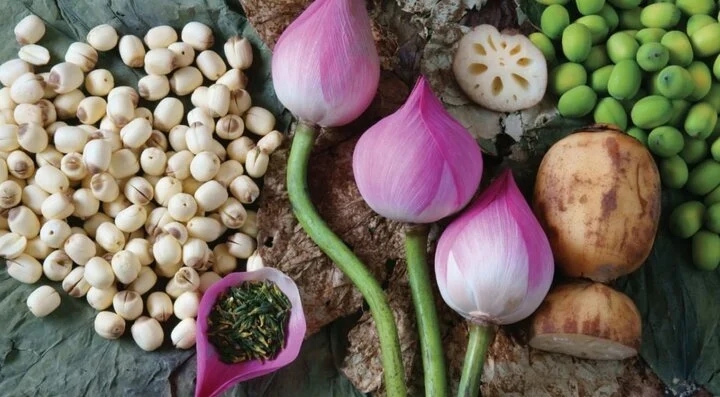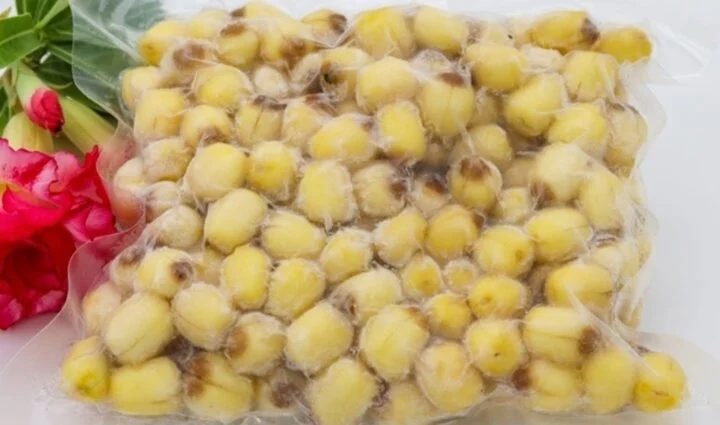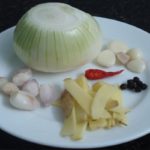Lotus seeds are a nutritious food commonly used in various dishes, from porridge and desserts to stews. Preserving fresh lotus seeds to prevent discoloration and nutrient loss for up to a year is a challenge.
Tips for preserving fresh lotus seeds for a year without discoloration
Selecting the right fresh lotus seeds is the first important step before preservation. Fresh lotus seeds are usually ivory or light green in color. Choose firm seeds with intact shells and bright colors, avoiding any that are cracked, broken, or discolored.
The next step is cleaning. Remove the shells and discard the bitter green embryo inside. Then, rinse the lotus seeds thoroughly with cold water to remove any dirt and impurities.
Soaking the lotus seeds in a brine solution for about 10-15 minutes is a helpful tip to prevent discoloration during long-term storage. The brine solution will help disinfect and prevent the seeds from turning black. After soaking, rinse the seeds with clean water and let them air dry.

Learn how to preserve fresh lotus seeds to maintain their color and freshness for a year. (Shutterstock)
Once cleaned, you can use one of the following methods to preserve fresh lotus seeds for an extended period:
Sun-drying or Dehydrating
After cleaning and soaking in brine, you can sun-dry the lotus seeds or use a food dehydrator to remove moisture and prevent mold during storage. If sun-drying, choose a cool, clean, and insect-free area for best results.
Once dehydrated, allow the lotus seeds to cool before transferring them into nylon bags or airtight containers. Store them in a cool, dry place, away from direct sunlight.
Refrigeration
One of the simplest and most effective ways to preserve fresh lotus seeds is to store them in the refrigerator. Place the seeds in nylon bags or airtight containers and keep them in the cool part of the fridge. The seeds will remain fresh for about 1-2 weeks.
For longer storage, transfer the seeds to the freezer. When needed, simply thaw them naturally and use them as desired. Spread the seeds on a tray and place them in the freezer until completely frozen. Then, transfer the frozen seeds to ziplock bags or airtight containers to prevent odor absorption from other foods in the freezer. Frozen lotus seeds can be stored for up to 6 months to a year.
Vacuum Sealing
Vacuum sealing is a modern food preservation method that extends the shelf life of lotus seeds while retaining their nutritional value and flavor. Use a vacuum sealer to remove air from the bags containing the seeds, then store them in the refrigerator or freezer. With this method, the seeds can remain fresh for several months.

Vacuum sealing and freezing is a clever way to preserve fresh lotus seeds and prevent discoloration for a year. (Mytour)
Airtight Container Storage
If you don’t have access to a vacuum sealer, you can store lotus seeds in airtight containers with rubber gaskets. These containers prevent air and moisture from entering, thus keeping the seeds from discoloring and maintaining their crispness. For added protection, include a small packet of desiccant or silica gel in the container to absorb any residual moisture.
Using Freeze-Drying Technology
Freeze-drying is an advanced food preservation technique that maintains the structure, color, and nutritional content of lotus seeds. The process removes water from the seeds without compromising their nutritional value. After freeze-drying, the seeds can be stored in bags or airtight containers, remaining fresh for an extended period without the need for refrigeration.
Preserving Cooked Lotus Seeds
If you’ve cooked lotus seeds and want to preserve the leftovers, let them cool completely before transferring them to airtight containers. Cooked lotus seeds can be stored in the refrigerator for about 3-5 days. When ready to use, simply reheat them.
For longer storage, transfer the cooked seeds to the freezer.
Some Notes on Preserving Lotus Seeds
During the preparation and preservation process, keep the following in mind to ensure optimal preservation:
– Avoid direct sunlight: Prolonged exposure to sunlight can cause discoloration and nutrient loss.
– Do not store fresh lotus seeds in humid conditions as this promotes mold and faster spoilage.
– Do not store for too long: Even when stored in the refrigerator, lotus seeds should not be kept for extended periods as it may affect their quality.
Proper preservation not only extends the shelf life of lotus seeds but also maintains their flavor and nutritional value. With these tips on preserving fresh lotus seeds, you can enjoy their benefits year-round without worrying about seasonal availability.
According to VTC News
More Useful Advice for Homemakers (Part 2)
Have you heard of the surprisingly easy tips to make cooking and household chores simpler? White radish eliminates the acrid taste of salted meat, adding alum to raw shrimp helps soften it, and adding cold water when frying eggs can make them crispy – these are just a few of the tricks to make your life easier.





































